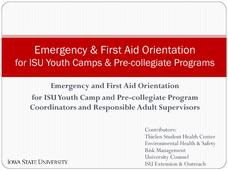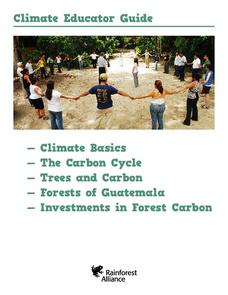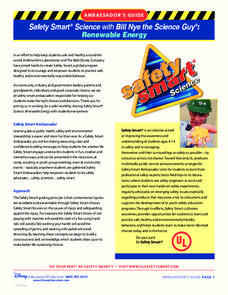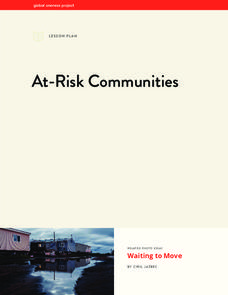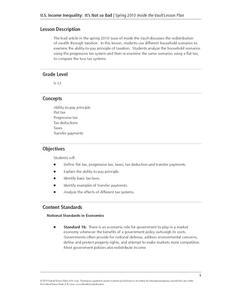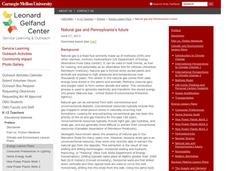Texas State Energy Conservation Office
Are Your Computers Wasting Energy?
After reading about the amount of energy that is used to power a personal computer, learners take a look at their own computer use and therefore, their energy consumption. They do this through a series of questions and computations on...
Humanities Texas
A President's Vision: Lyndon Baines Johnson
Learners take a closer look at the presidency of Lyndon B. Johnson, including the Great Society and the passage of the Voting Rights Act, through image analysis and primary source worksheets.
Iowa State University
Emergency & First Aid Orientation
Here you'll find a presentation that covers a wide range of emergency and first aid topics, such as evacuation planning, what to do in the event of a fire or severe weather, and addressing a number of medical emergencies, such as...
Rainforest Alliance
Climate Educator Guide
Climate change is a hot topic in the news. Class members examine carbon dioxide data to analyze trends of our atmospheric makeup over time. They also discuss climate and climate change, and determine how these changes are affecting life...
National Library of Medicine
Your Environment, Your Health: Air Quality
Some scientists argue that air pollution now causes more deaths than smoking. The second unit in a six-part series focuses on air quality. Scholars learn what's in the air, how clean the air around their school is, and what they can do...
National Library of Medicine
Your Environment, Your Health: Runoff, Impervious Surfaces, and Smart Development
Can a sidewalk increase the amount of pollution in local streams? Scholars learn the answer to this question though research and experimentation in the fifth unit in the six-part series. Pupils study runoff, impervious surfaces, and the...
National Library of Medicine
Your Environment, Your Health: Food Safety
Did youknow that chicken causes the greatest risk of food-borne illness. The fourth unit in a six-part series addresses food safety. Scholars research common scenarios of food causing illness through the National Institute for Health....
Teach Engineering
An Introduction to Air Quality Research
Viewers are a PowerPoint are exposed to the idea that pollutants are in more than just the air we breathe. the presentation provides information about the layers of the earth's atmosphere and takes a look at the pollutants in the...
Disney
Renewable Energy
Bring some energy to your physical science curriculum with this engaging Bill Nye the Science Guy instructional activity. Based on his Renewable Energy video, young scholars explore the concepts of potential and kinetic energy and learn...
Global Oneness Project
At-Risk Communities
"Waiting to Move," a photo essay by Ciril Jazbec, brings into sharp focus the threats posed by climate change. Class members examine images of Shishmaref Island and the Native Alaskan Inupiate coastal villages that are impacted by rising...
Montana Natural History Center
Studying Grassland Ecosystems
At first glance, grassland ecosystems might seem dull and uninteresting, but once you start to explore it's amazing the things you'll find! Through this series of engaging lessons, activities, and experiments, elementary students examine...
Federal Reserve Bank
U.S. Income Inequality: It's Not So Bad
What is the difference between a flat tax, progressive tax, tax deduction and transfer payments? Pupils examine the ability-to-pay principle of taxation through discussion, problem solving, and a variety of worksheets on topics from US...
Rainforest Alliance
How Do Jaguars and Howler Monkeys in Belize Depend on Us?
How does weather play a role in the lives of land and sea creatures? Find out with a lesson focused on habitats and the ways animals from different homes are connected. Here, learners explore how the life of a jaguar and howler monkey...
Curated OER
Unit 2: Global to Local: Understanding My Place in the Hydrosphere
What does the ground around your home have to do with water pollution? Young ecologists learn about their local watershed and create their own cause-and-effect models of the hydrosphere.
Curated OER
Unit 3: Scientific Writing
Write-on! Demonstrate a writing model and support learners as they write an informational essay on a water resource issue of your (or their) choosing. The lesson plan provides a well-scaffolded summative writing experience that wraps up...
Curated OER
Using Rhythm Instruments to Tell a Story
After watching a video of Peter and the Wolf, and identifying the instruments used to represent each character, class members use rhythm instruments to represent the actions in the song, "What Would I do."
Appalachian State University
The Fault in Our Stars: A Movie Study Guide for Eighth Grade Language Arts, Social Studies, and Science
How would you spend your last days with a loved one? The movie guide for The Fault in Our Stars prompts scholars to compare important scenes from the novel to the film and contains background information about the author, guided...
Carnegie Mellon University
Natural Gas and Pennsylvania’s Future
Beginning with a general discussion about natural gas, methane, and hydrocarbons, a few videos and diagrams are projected to support the lecture. Individuals participate in a brief activity by drinking juice through a straw, and then...




